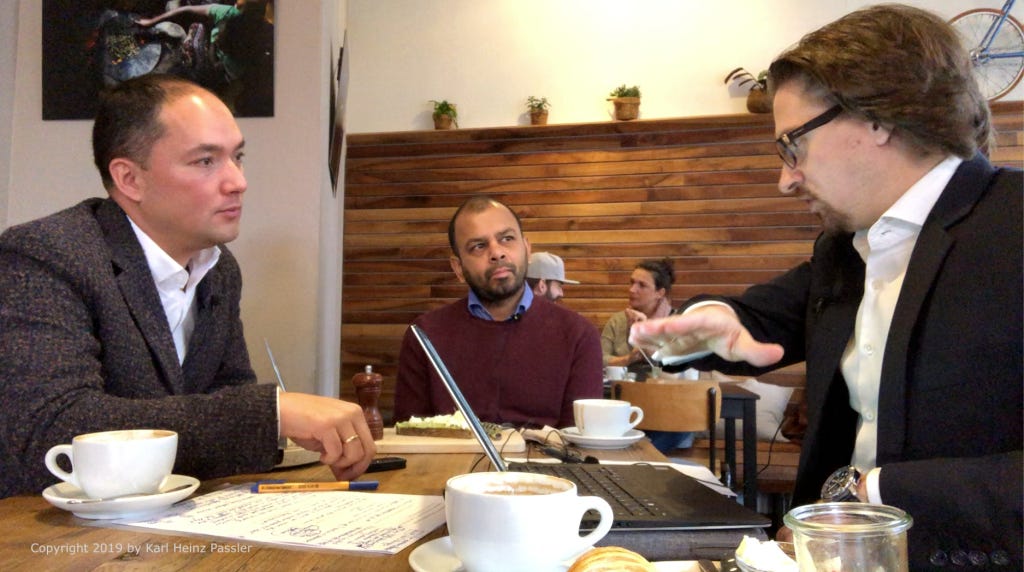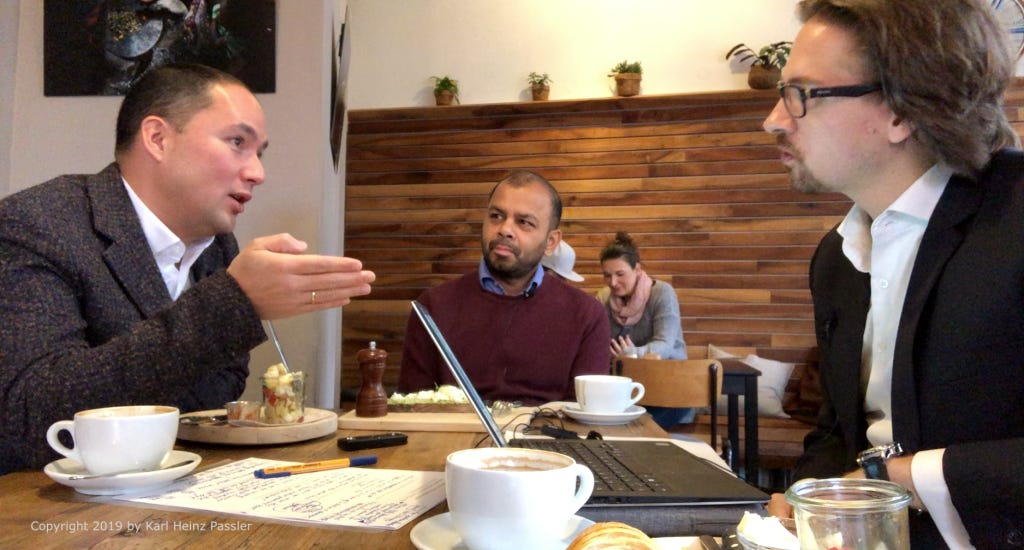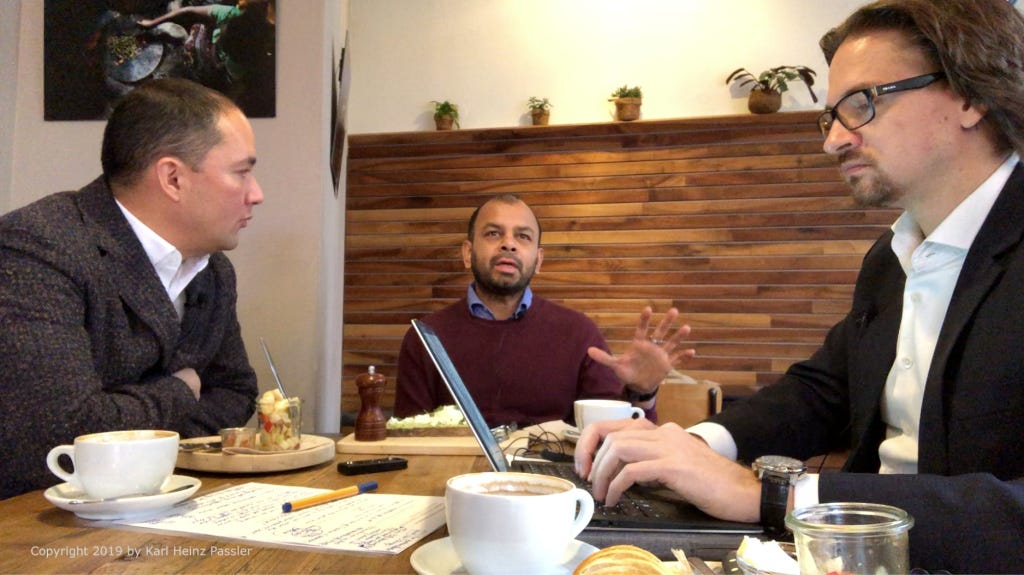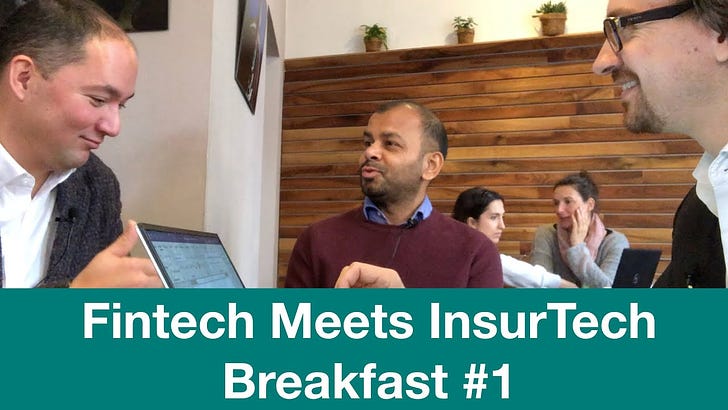The ‘FinTech meets InsurTech’ Breakfast Series #1
Uli Kleber, The Digital Insurer’s news correspondent for Germany, met up with FinTech influencer Samarth Shekhar from SixThirty Ventures and InsurTech influencer Karl Heinz Passler (InsurTechTalk) discuss what FinTech and InsurTech have in common, what excites Karl Heinz about heating system manufacturers and how Samarth got his first credit card after he founded his own company.
This interview was first published by The Digital Insurer on Dec. 11th, 2019 at https://www.the-digital-insurer.com/fintech-meets-insurtech-breakfast-with-samarth-shekahr-and-karl-heinz-passler/
As FinTech and InsurTech are growing up and value propositions are sharpened, startups look outside to discover how their business models can be applied to new opportunities beyond the original sector. So, the timing is ripe to break the silos and take a holistic look at financial service startups.
In this interview, they discuss what FinTech and InsurTech have in common, what excites Karl Heinz about heating system manufacturers, and how Samarth got his first credit card after he founded his own company.

Hi Samarth, hi Karl Heinz, great that you agreed to meet up for breakfast in Frankfurt. Before getting started, can you please share your personal definitions of FinTech and InsurTech?
Samarth: As investors, we define FinTech, in a broad sense, as startups using technology to offer or enable financial services, typically not older than 10 years. So, typically investment series A and B with a technology that can support financial services in a broad sense.
Karl Heinz: There is no fixed, official definition of InsurTech. Therefore, my definition of InsurTechs is start-ups active at the intersection of three domains: insurance, technology, and innovation.
In your view, what was the starting point for the FinTech / InsurTech movement?
Samarth: For me, that was Clear2Pay which I encountered in Europe around 2010. To me, FinTech has been an evolution instead of a revolution. New technology was the key, but the actual driver was the 2008 credit crisis. Back then, new business models started with P2P lending and the use of alternative data for lending as markets were so tight. Additionally, you had a large number of smart, educated bankers that had been laid off, disposed of ample financial resources, and the willingness to start something new.
Karl Heinz: The first InsurTech I encountered was also focused on P2P: I saw friendsurance presenting in 2012. Insurers did not face a lending crisis but have seen a crisis in interest rates that is still going on. Therefore, the focus on costs and underwriting margins has become much more important as insurers can no longer rely on capital gains from investments.
Did you also see a crisis in client trust for insurers?
Karl Heinz: I think that there is a perceived crisis in client satisfaction. But quite frankly, for many clients, this does not seem to be an issue because insurance remains a low involvement product.
Both Fintech & Insurtech started with a disruptive approach – where are we at today?
Samarth: When we launched the FinTech Forum conferences in 2013 there was a lot of excitement around the Lending club which was a new initiative set up to deal with the credit crunch in the aftermath of the financial crisis. Then many players realized that customer acquisition costs were just too high to really breakthrough with a disruptive approach. So, in 2015/2016 the first companies started to join forces with the established financial and non-financial institutions, essentially moving towards collaborative disruption with a B2B2C model. What I have seen as a successful approach was for FinTechs to stay in the B2C market but align with a B2B partner. In that way, they stay in the know about the needs of the end customers but also create additional sources of revenue to continue operating their business.
In the end, the question is: can the start upscale faster than the incumbent gets innovation?
KHP: I work as a mentor for our startup scouts at the Baloise insurance group. We get approached a lot by enablers promising to do things faster, cheaper, and better. The big question is if they can get traction by creating impact and relevance for us quickly.
Samarth: Good point, Karl Heinz. We focus on B2B and B2B2C early-stage startups that offer a value proposition with an opportunity to partner. So, we ask: Is your business model a vitamin or a painkiller? Because of clients and consequently we ourselves look for the painkillers and not the nice-to-haves.
KHP: Yes, and often we find that it is the experienced teams that create relevant solutions for the industry. Then, you need to find a key decision-maker inside the company to support you in bringing your solution to life.

What are the biggest similarities/differences in the FinTech and InsurTech market?
Samarth: I think we have already moved beyond the traditional sector borders and see a large converging of financial services. It is no longer only banks and insurers but telcos, retailers, and carmakers that offer financial services as an extension to their original product proposition. Therefore, they are all potential customers of innovative InsurTechs and FinTechs. Particularly, if you look at more transaction-based products and insurance tagalongs at the point of sales like warranty extensions or pet insurance that is offered when the customer buys dog food. These are the low hanging fruits where you can fully leverage the advantages of swift online transactions.
KHP: Yes, I remember an example when I was approached by an online retailer selling heating systems. His clients actually asked him to offer a warranty extension. He had all the statistics on all the manufacturers at hand which made it a pretty easy product to create. Furthermore, it is not even subject to BaFin regulation. The great thing about this example is that it was a pull product driven by customer needs and not the proverbial push product of insurance.
Speaking of the move of non-traditional players into the sector and meeting customers at their point of need: how important are ecosystems in your opinion?
KHP: I think that the race for ecosystems is nothing new as most ecosystems already existed beforehand. Also, for many players, it is just about adding an additional sales channel.
To me instead, an ecosystem is something different. It is about creating a symbiotic relationship and growing together to create something new.
Samarth: I agree. First, back in 2014/2015, it was simply about cross-selling. The second wave in 2015/2016 started to ask “how can I use my partner’s customer base to create something new?”. Then came the sharing economy which opened up completely new markets like an insurance for ride-sharing or AirBnB-apartments. So, the true ecosystem play is about finding blue oceans, not just about adding new sales channels.
To find blue oceans, we often hear that data is key. Which data use cases, like OpenBanking and mobile payments, can be applied in both FinTech and InsurTech?
Samarth: Open Banking is definitely one of the top themes we look at. There are two use cases that immediately come to my mind and which are highly relevant in my opinion:
The first one is income verification on the fly and therefore the possibility to provide loans quickly. If I can look into your banking history, it is so much easier to evaluate your creditworthiness and make the process smoother and quicker.
The other use case is centered around KYC/AML [note of the editor: Know-your customer = ID verification and anti-money laundering]. Knowing the history of a new potential client allows creating an onboarding process with much less hassle.
KHP: When you look at bancassurance in Germany, there are few truly integrated players like R+V or Sparkassenversicherung. Compared to other countries in which banks are an important sales channel, there is still a lot of space to create further opportunities in Germany. To be able to do so, you need to open up and help your partner profit, thereby increasing the size of the pie in the process.
In this regard, I think that APIs will open up new possibilities, i. e. what can I offer to other partners in terms of data? Giving others access to your data can create opportunities for a new business that you may not have thought about beforehand and if it creates value for the customers, they will also consent to you using their data.
Samarth: When I started my company back in 2012, it was hard to get a credit card as an entrepreneur. But Amazon and Deutsche Bahn gave me one based on the transaction data they held of my purchases and travel. It is this possibility to leverage existing data and apply it to a new use case that holds value for companies and customers alike.

Thank you for these insights, Samarth and Karl Heinz. As we now come to a close, what will be, in your opinion, the hottest two topics in the next 6-12 months?
KHP: Definitely ecosystems continue to be the hot topic. What is my role today and what do I want it to be in the future? Insurers particularly, now have to lay the groundwork and know where they want to go to be relevant in the important ecosystems of the future.
Samarth: We have pretty good insights on the hot topics through the applications to our annual FinTech Forum which takes place in Frankfurt in November.
For this year, we see three main topics:
Contain the proliferation of apps: Companies need to converge their offerings into one single app. Space on the smartphone home screen has become a pricey piece of real estate and most users are weary to install another app.
Deal with customer acquisition costs by moving to B2B2C: Many startups are now realizing that they can profit from an established customer base by becoming the pain killer for the aches of an incumbent player.
Will finance become an add-on? I am curious to see what the Apple Card, launched by Apple and Goldman Sachs will do to the sector. Are banks really willing to take the back seat in another player’s ecosystem?
Thanks to The Digital Insurer for the opportunity to make this interview available to the InsurTechTalk community! It was first published on Dec. 11th, 2019 at https://www.the-digital-insurer.com/fintech-meets-insurtech-breakfast-with-samarth-shekahr-and-karl-heinz-passler/
Resources and Insights
The Organisations
The Digital Insurer; https://www.the-digital-insurer.com/
The SixThirty Venture Fund; https://sixthirty.co/
The InsurTechTalk Blog; http://insurtechtalk.com/
The Participants
Uli Kleber, Manager - Insurance, Management Consulting at Accenture, News Correspondent Germany & Switzerland at The Digital Insurer; https://www.linkedin.com/in/uli-kleber/
Samarth Shekhar, VC at SixThirty Ventures, Co-Founder FinTech Forum, WSJ/ FN FinTech40; https://www.linkedin.com/in/samarthshekhar/
Karl Heinz Passler, Working @ Basler / Baloise, InsurTech Thought leader, Influencer, and creator of the InsurTechTalk Letter; https://www.linkedin.com/in/karlheinzpassler/


